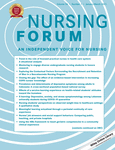Exploring telehealth in the graduate curriculum
Abstract
Background
With an increase in patient demand and a decrease in healthcare professionals, telehealth is able to provide needed services to patients, but appropriate training in telehealth is crucial for providers to deliver excellent patient care.
Method
Nurse researchers developed a quality improvement project targeting telehealth in the graduate nursing curriculum. A two-part evidence-based curriculum was developed for graduate family nurse practitioner (FNP) students. Part one consisted of a lecture that focused on increasing students' knowledge, and part two enhanced skills through simulation.
Results
Data were collected through qualitative and quantitative surveys. The qualitative data were analyzed for themes and statistical analysis of the quantitative data was completed (t-scores and descriptive statistics). Results showed that FNP students perceived the telehealth curriculum as educational and recommend it be continued for future FNP cohorts.
Conclusion
Using evidence-based practice and telehealth experts graduate nursing programs should introduce the telehealth curriculum for FNP students through in class lecture and simulation.
CONFLICT OF INTERESTS
The authors declare that there are no conflict of interests.




